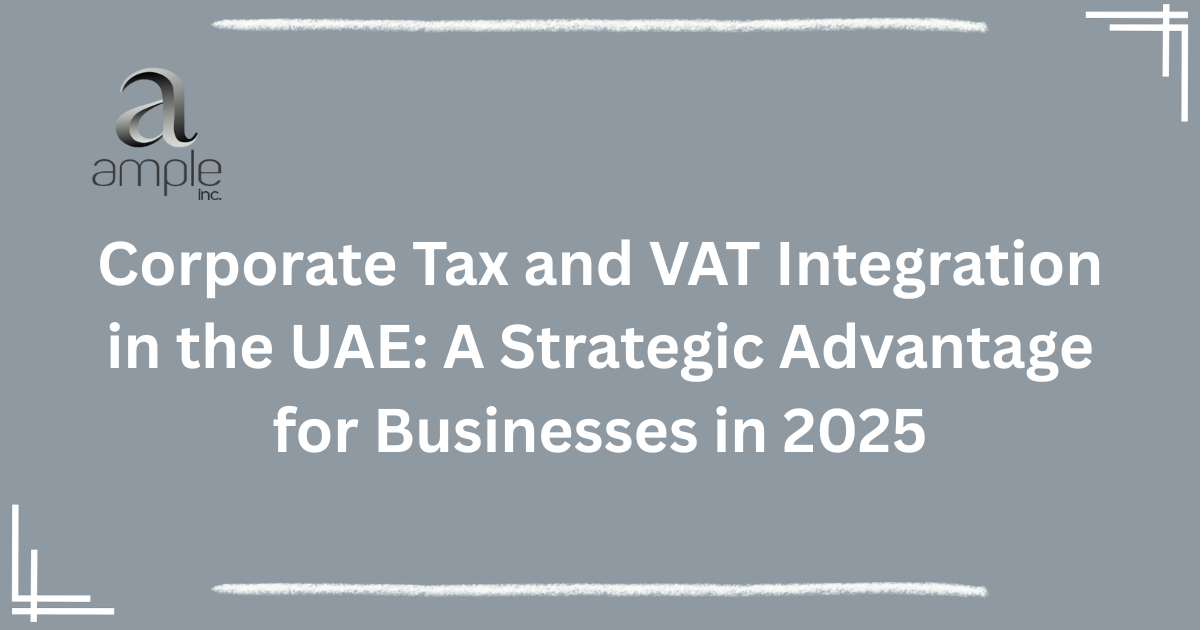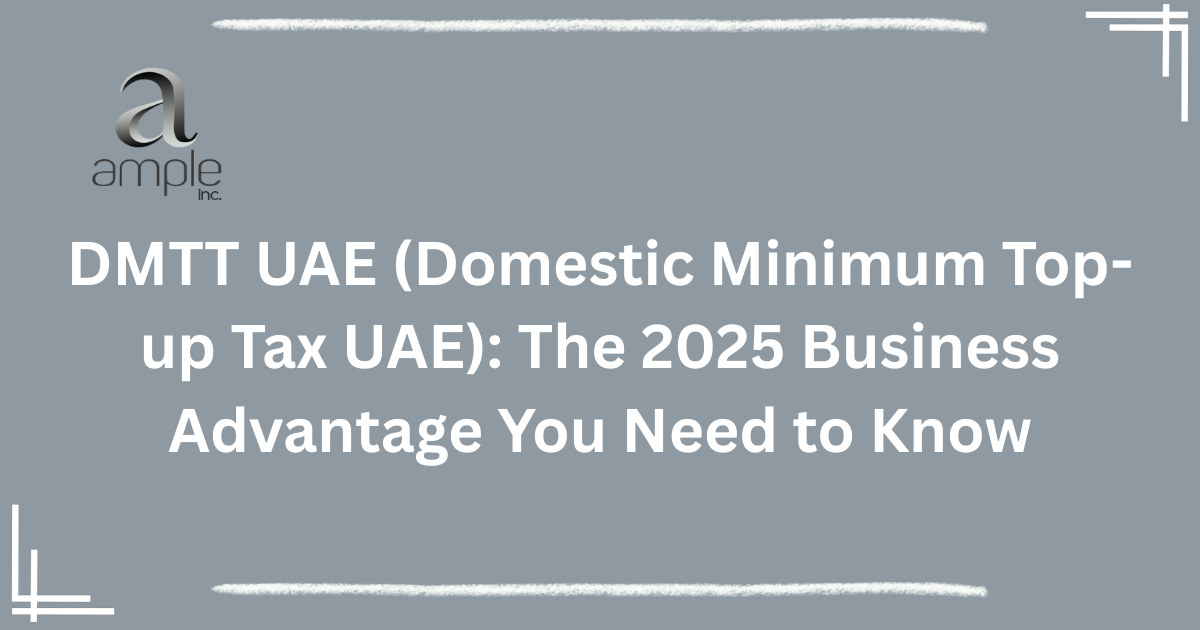Introduction
Corporate tax in the UAE is no longer just a policy buzzword it is now a reality that every registered business must prepare for. Introduced in June 2023, the UAE’s corporate tax regime has created a new compliance culture for businesses that were historically accustomed to a tax-free environment.
As we move into 2025, deadlines are looming, especially the September 30, 2025 filing date for businesses that follow a calendar year (January–December). Missing the deadline could result in significant penalties, strained business operations, and reputational risks.
This blog is a complete step-by-step guide to help you understand:
- What corporate tax filing is
- Who must register for corporate tax in the UAE
- How to file your return step by step
- Deadlines for different tax periods
- Documents required and common mistakes to avoid
- Corporate tax FAQs to clarify gray areas
Whether you are a small business owner, CFO of a multinational, or a freelancer working under a trade licence, this blog is designed to provide you with actionable, up-to-date, and professional guidance for corporate tax filing in the UAE.
Understanding UAE Corporate Tax: What You Need to Know
The Background
Until recently, the UAE was globally recognized as a “tax-free” hub. While this remains partly true for personal income tax, the corporate environment has changed since 1 June 2023, when the UAE implemented a federal corporate tax system under Federal Decree-Law No. 47 of 2022.
The Corporate Tax Rate
- 0% on taxable income up to AED 375,000
- 9% on taxable income above AED 375,000
- Free Zone entities: potentially benefit from 0% on Qualifying Income, subject to meeting FTA conditions.
Who Pays Corporate Tax?
Corporate tax applies to:
- Businesses and companies incorporated in the UAE.
- Foreign companies with a Permanent Establishment (PE) or nexus in the UAE.
- Free Zone businesses (with specific exemptions).
- Freelancers and self-employed professionals holding a trade licence.
Exemptions apply to:
- Government entities
- Extractive industries (natural resources)
- Charities and public benefit organizations
- Certain investment funds
Who Should Register for Corporate Tax in the UAE?
One of the most common questions businesses ask is: “Do I need to register for corporate tax in the UAE?”
The answer is yes, if you fall under the category of “Taxable Person.”
Taxable Persons Include:
- UAE companies carrying on business in the UAE.
- Non-residents with a permanent establishment or income source in the UAE.
- Free Zone persons (subject to qualifying criteria).
- Licensed freelancers who earn above the exemption threshold.
Registration Deadlines
- Entities established before 1 March 2024: had pre-set registration deadlines published by the FTA.
- Entities established after 1 March 2024: must register within 3 months of incorporation.
Failure to register on time may result in penalties (though the FTA has announced limited penalty waivers for certain late registrations in 2025).
Key Deadlines for Corporate Tax Filing in 2025
The general rule: Corporate tax returns must be filed within 9 months from the end of the relevant tax period.
- For businesses following Jan–Dec year → Deadline: 30 September 2025.
- For businesses following Apr–Mar year → Deadline: 31 December 2025.
- Other fiscal years → Add 9 months to year-end.
Tip: Mark deadlines in advance and set reminders in your accounting software to avoid last-minute rush
Step-by-Step Guide: How to File Corporate Tax in UAE
Now, let’s break down the filing process into clear steps:
Step 1: Register for Corporate Tax on EmaraTax
- Visit the FTA’s EmaraTax portal.
- Create an account → Apply for Corporate Tax → Obtain your Tax Registration Number (TRN).
Step 2: Gather Required Documents
Prepare the following before filing:
- Trade Licence copy
- TRN certificate
- Audited financial statements
- General ledger & trial balance
- Fixed asset register
- VAT records (if registered)
- Previous year’s tax adjustments (if applicable)
Step 3: Calculate Taxable Income
Start with accounting profit, then adjust by:
- Deducting exempt income
- Adding back non-deductible expenses
- Applying small business relief (if turnover ≤ AED 3 million)
- Considering Free Zone elections if applicable
Step 4: Access the EmaraTax Corporate Tax Return
The return consists of Parts A–I:
- Part A – General Information
- Part B – Elections & Reliefs
- Part C – Income & Adjustments
- Part D – Tax Computation
- Part E – Schedules (Free Zone, Groups, Foreign Tax Credit, etc.)
- Part F – Balance Due/Refund
- Part G – Attachments (financials, disclosures)
- Part H – Declarations
- Part I – Payment instructions
Step 5: Submit the Return
- Review all entries carefully.
- Attach audited financial statements.
- Double-check figures against your books.
- Submit electronically.
Step 6: Pay the Tax
Tax payment must be made by the filing deadline (e.g., 30 September 2025).
Pro Tip: Pay early to avoid last-minute payment failures due to banking delays.
Common Mistakes to Avoid in Corporate Tax Filing
- Missing the registration deadline → penalties.
- Not maintaining audited financial statements.
- Misclassifying Free Zone income as exempt when it doesn’t qualify.
- Forgetting related-party disclosures.
- Late payments, leading to daily penalties.
Corporate Tax FAQ
1. What happens if I miss the September 2025 filing deadline?
You will face penalties, which can include monetary fines and additional interest on unpaid tax.
2. Do freelancers need to register for corporate tax?
Yes, if they hold a trade licence and earn above the AED 375,000 threshold.
3. Are Free Zone companies exempt from corporate tax?
Not automatically. They must qualify under FTA rules and only qualifying income is 0% taxed.
4. How long should I keep tax records?
At least 7 years, as per FTA requirements.
5. Can I revise a return if I make an error?
Yes, using Voluntary Disclosure via EmaraTax.
Conclusion
Corporate tax filing in the UAE for 2025 is more than a legal obligation it is a strategic responsibility that ensures your business remains compliant and avoids unnecessary penalties.
With the September 30, 2025 deadline fast approaching for calendar-year businesses, now is the time to:
- Review your financial records,
- Register (if not done),
- Prepare your filing documents, and
- Submit your corporate tax return through EmaraTax.
Staying compliant not only avoids fines but also builds trust with clients, investors, and regulators in the UAE’s evolving financial ecosystem.
Take this guide as your roadmap to stress-free corporate tax filing in 2025.
Why Choose Ample Inc for Corporate Tax Filing UAE 2025?
Filing corporate tax in the UAE isn’t just about meeting deadlines it’s about getting it right the first time. Errors in calculation, misinterpreting Free Zone rules, or missing relief opportunities can cost your business thousands of dirhams in penalties or lost tax benefits.
This is where Ample Inc comes in.
At Ample Inc, we specialize in:
- Corporate Tax Registration & Filing guiding you through the EmaraTax process smoothly.
- Free Zone Tax Planning ensuring you qualify for the 0% regime where applicable.
- Compliance & Documentation preparing and reviewing financial statements, disclosures, and related-party reports.
- Penalty Prevention helping you avoid costly mistakes with proactive advisory.
- Ongoing Tax Advisory from tax strategy to day-to-day compliance, we stay by your side.
Why Businesses Trust Ample Inc?
- Deep expertise in UAE Corporate Tax regulations
- Proven track record with SMEs and multinational clients
- Transparent pricing with no hidden costs
- A team of dedicated professionals available to guide you before, during, and after filing
Ready to File Before the September 2025 Deadline?
Don’t wait until the last moment. Partner with Ample Inc and ensure your corporate tax filing in UAE is smooth, compliant, and penalty-free.
Contact us today to schedule a consultation with our tax advisors and secure your business’s compliance before the September deadline.



